Call number 74 (May-Aug 2026)
Good educational practices in the development of skills in the digital age
Closing: February 28, 2026
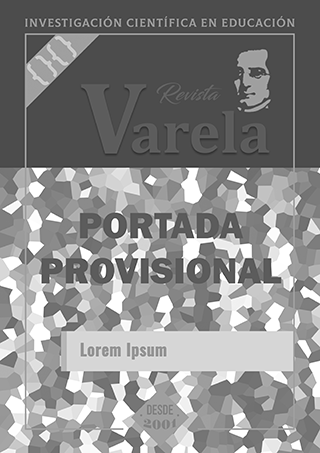
The Varela Journal (https://revistavarela.uclv.edu.cu), a pedagogical publication managed by the Faculty of Early Childhood Education of the Central University “Marta Abreu” of Las Villas, is pleased to present to its readers and contributors, published continuously, issue number 73, corresponding to the January-April 2026 period. This issue's monographic section will address the topic:
EDUCATIONAL ADVANCES IN KNOWLEDGE MANAGEMENT IN TODAY'S SOCIETY
The scientific and technological development that characterizes today's society requires the continuous improvement of knowledge management, considered a fundamental strategic resource for individuals of any country, latitude, culture, or level of development. Therefore, it is essential that the educational field promote the creation of learning environments based on current methods of working with technologies and information at all types and levels of education.
Educational institutions must respond to the new expectations of lifelong learning. Knowledge management is therefore the cornerstone for individuals to become effective learners and contribute to social development, which is heavily dependent on advances in the generation of new scientific knowledge. This underscores the importance of promoting an education that provides learners with the theoretical, methodological, and technical tools to develop the knowledge management skills required in today's world.
This issue, in its MONOGRAPH section, offers contributions that address research, innovations, and experiences in educational practice related to this theme, adapted to the demands of contemporary society. Additionally, in its EDUCATIONAL RESEARCH section, this issue presents articles unrelated to the monograph's theme, expressing the results of scientific work from different perspectives within the field of education. This issue will be completed as the review, editing and layout process of the submitted articles is finalized and will close at the end of April 2026.
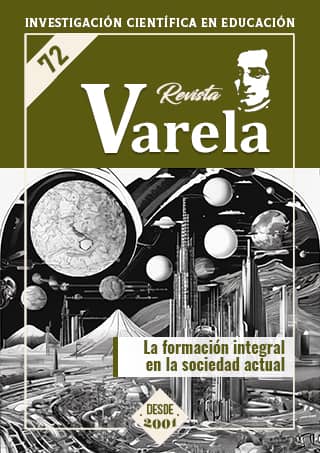
(CONTINUOUS PUBLICATION MODE)
Varela Journal (https://revistavarela.uclv.edu.cu), an educational publication managed by the Faculty of Early Childhood Education at Marta Abreu Central University of Las Villas, is pleased to present to its readers and contributors, as part of its ongoing publication, issue 72, corresponding to the September-December 2025 period, whose monographic section will address the topic:
COMPREHENSIVE EDUCATION IN TODAY'S SOCIETY
Comprehensive education, in general terms, is one of the fundamental tools by which human beings can achieve their maximum development, both academically and professionally and personally. Today's complex and rapidly changing world requires comprehensive professionals who are not only capable of contributing their expertise to the development of a particular sector, but who also actively contribute as citizens to the construction of a more equitable, supportive, inclusive, and free society.
Comprehensive education involves an intentional learning perspective, aimed at strengthening a responsible, ethical, critical, participatory, creative, and supportive personality with the ability to recognize and interact with their environment in order to build their cultural identity. It is also oriented towards a conception more related to the modern world, given that the new skills, competencies, and development needs of individuals are more focused on autonomy, creativity, and the ability to inquire and think, which favor their harmonious and balanced development, particularly in times of rapid change.
Specifically, this issue offers contributions in its MONOGRAPHIC section that address research, innovations, and experiences in educational practice related to the aforementioned theme, tempered by the demands of today's society. Likewise, this issue features articles in its EDUCATIONAL RESEARCH section that are unrelated to the monographic theme, expressing the results of scientific work from different angles within the field of education. This issue will be completed as the process of reviewing, editing, and formatting the submitted articles is finalized, and will close at the end of December 2025.
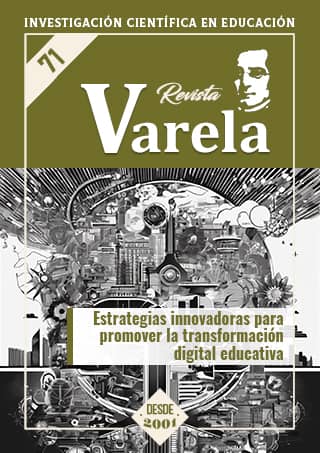
(CONTINUOUS PUBLICATION MODE)
Varela Journal (https://revistavarela.uclv.edu.cu), a pedagogical publication managed by the Faculty of Early Childhood Education of the Central University “Marta Abreu” of Las Villas, is pleased to present to its readers and contributors, starting with its continuous publication mode, issue 71, corresponding to the May-August 2025 period. The special section will address the topic:
INNOVATIVE STRATEGIES TO PROMOTE DIGITAL EDUCATIONAL TRANSFORMATION
Digital educational transformation is a process that seeks to improve the quality of education by integrating digital technologies into all aspects of the education system. Digital technologies have evolved from standalone projects to networks of tools and programs that connect people and objects around the world and help address personal and global challenges. Digital innovation has demonstrated its capacity to complement, enrich, and transform education, and has the potential to accelerate progress toward achieving Sustainable Development Goal 4 (SDG 4) for education, as well as to transform universal access to learning.
The implementation of innovative strategies to promote digital transformation in education can enhance the quality and relevance of learning, reinforce inclusion, and improve the management and governance of education. Specifically, this issue offers, in its MONOGRAPHIC section, the opportunity to submit contributions addressing research, innovations, and experiences in educational practice related to the aforementioned topic, tailored to the demands of today's society.
Likewise, this issue's RESEARCH IN EDUCATION section features articles unrelated to the monograph's topic, which express the results of scientific work from different perspectives in the field of education.
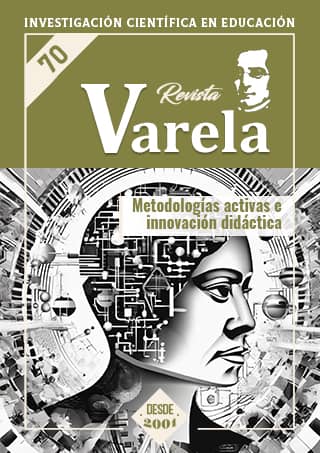
(CONTINUOUS PUBLICATION MODE)
Varela Journal (https://revistavarela.uclv.edu.cu), a pedagogical publication, managed by the Faculty of Early Childhood Education of the Central University "Marta Abreu" of Las Villas, has the pleasure to announce to its readers and collaborators from the continuous publication modality, number 70 corresponding to the period January-April 2025, whose monographic section will deal with the topic:
ACTIVE METHODOLOGIES AND DIDACTIC INNOVATION
Didactic innovation requires the use of participatory and collaborative methodologies, in which the student is the active protagonist of his own learning. However, educational reality has still remained anchored to traditional teaching models that do not always respond to the needs and demands of students and today's society.
Therefore, it is necessary to continue contributing to the development of curricular models based on teaching methodologies and strategies that enhance the technical, human and social performance of students, that enable the adequate, efficient and ethical use of information and communication technologies for the creation of learning and information resources and that promote interdisciplinary work and lifelong learning, among other aspects.
The implementation of active learning methodologies that involve students in practical and meaningful activities contribute to the application of theoretical knowledge acquired in class to real situations. Precisely, this issue offers in its MONOGRAPHIC section the possibility to present contributions that address research, innovations and experiences of educational practice, in relation to the subject referred to, tempered to the demands of today's society in order to achieve more just and equitable societies.
It also features in its EDUCATIONAL RESEARCH section articles unrelated to the monograph topic, which express the results of scientific work from different angles in the educational field.
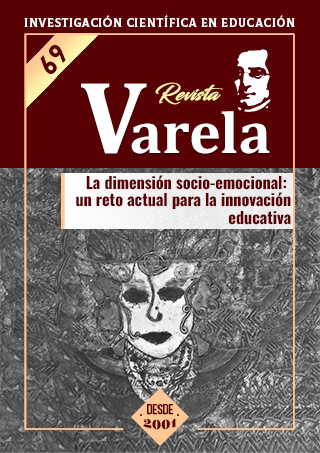
Varela Journal (https://revistavarela.uclv.edu.cu), a publication with a pedagogical profile, managed by the Faculty of Early Childhood Education of the Central University “Marta Abreu” de las Villas, is pleased to present to its readers and collaborators number 69 corresponding to the September-December 2024 stage, which will address the topic:
THE SOCIO-EMOTIONAL DIMENSION: A CURRENT CHALLENGE FOR EDUCATIONAL INNOVATION
One of the current problems facing educational systems is framed in the limited attention given to the socio-emotional dimension from the teaching-learning process; In general, there is a tendency to focus the process on cognitive issues, as well as on the formation of technological skills, ignoring the importance of socio-emotional aspects, which, in addition to having a significant influence on the comprehensive learning of students, are increasingly necessary to solve life problems.
There are multiple ways to develop educational programs with a socio-emotional focus at various school stages; among them, the following stand out in general: the conceptualization and classification of emotions, the characteristics of the main emotions, affective phenomena, emotion and health, emotion and motivation, emotional self-knowledge and recognition of the emotions of others. Likewise, the importance of addressing aspects related to: tolerance to frustration, anger management, emotional regulation strategies, socio-emotional behaviors, positive attitude towards life, ethical and social responsibility, critical analysis of social norms and emotions in decision-making, as well as subjective well-being and quality of life, among others, is recognized.
This issue offers, in its MONOGRAPHIC section, the possibility to present contributions that address research, innovations and experiences in educational practice, in relation to the different perspectives on the socio-emotional dimension, both from the learning process of students at different educational levels, as well as in the training of teachers, who are responsible for its implementation during their professional performance.
It also features, in its EDUCATIONAL RESEARCH section, articles unrelated to the monograph topic, which express the results of scientific work from different angles in the educational field.
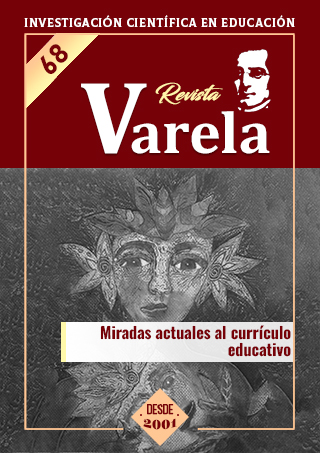
Varela Journal (https://revistavarela.uclv.edu.cu), a publication with a pedagogical profile, managed by the Faculty of Early Childhood Education of the Central University “Marta Abreu” de las Villas, is pleased to present to its readers and collaborators number 68 corresponding to the May-August 2024 stage, which will address the topic:
CURRENT LOOKS AT THE EDUCATIONAL CURRICULUM
The world in which we live, characterized by the rapidity of its changes and the intensity of its interconnection and interdependence, poses new challenges and offers new opportunities for the search for sustainable social and human development. In these processes, learning occupies a central place, since it implies the effective acquisition of basic and transferable skills both for the world of work and for personal, civic and social life. Precisely, among these challenges, the educational curriculum stands out as a fundamental tool to achieve the transformations that are required in today's society.
The educational curriculum constitutes a set of interconnected aspects, conceptual, methodological and practical to offer students of different educational levels, appropriate academic training; It refers not only to the formal structure of study plans and programs, but to all aspects that involve the choice of content, its disposition, the needs of society, educational or didactic materials, available technology, among others. Hence the importance of curricular design, as an advance vision of the curriculum, which encompasses a decision-making process prior to its development.
Precisely, this issue offers in its MONOGRAPHIC section the possibility of sharing research, innovations and experiences of educational practice, in relation to the various views on the educational curriculum and curricular design, tempered with the new demands of today's society in order to achieve more just and equitable societies. Likewise, it shows in its RESEARCH IN EDUCATION section articles unrelated to the topic of the monograph, which express the results of scientific work from various aspects of the educational field.

Varela Journal (https://revistavarela.uclv.edu.cu), a publication with a pedagogical profile, managed by the Faculty of Early Childhood Education of the Central University “Marta Abreu” de las Villas, is pleased to present to its readers and collaborators number 67 corresponding to the January-April 2024 stage, which will address the topic:
ADVANCES AND PERSPECTIVES IN SCIENCES OF EDUCATION
The accelerated appearance of new knowledge, a product of the rapid development of science and technology in the current era, has determined the appearance of new fields of knowledge in different areas of knowledge; In particular, Educational Sciences do not escape these processes of integration and differentiation that characterize science today.
Precisely this issue presents in its MONOGRAPH section the possibility of sharing research, innovations, and experiences that offer contributions to Educational Sciences based on the analysis of educational phenomena from various perspectives and delving into specific contexts, which can be beneficial for our readers. Likewise, its RESEARCH IN EDUCATION section shows articles unrelated to the topic of the monograph, which express the results of scientific work from various aspects of the educational field.

Varela Journal, managed by the Faculty of Early Childhood Education of the "Marta Abreu" Central University of Las Villas, is pleased to present monograph number 66 corresponding to the September-December 2023 period, which deals with the topic:
CHALLENGES OF DAILY WORK FOR THE EDUCATOR
The task of the education professional is not limited to teaching a conglomerate of knowledge that many soon forget, but rather, because it is so comprehensive, it includes everything that can influence the formation of the human being for their integration into society and achieve performance. cash on it. That is a huge responsibility. Those who have understood and assumed it dedicate their lives with dedication and tenacity.
Each historical period nuances the challenges that educators face to solve. Social and labor relations, influenced by technological scientific development, by the struggles to achieve new freedoms, social justice and rights, condition the demands on education. Consequently, an update of the challenges of the daily work of the educator can be specified in the following trends: educating students to learn to learn, developing digital competence, being creative and innovative, attending to individual differences, managing new strategies evaluation, research in education, among others.
Precisely, this number offers in its MONOGRAPHIC section contributions that address research, innovations, compilations and experiences related to the work of educators and can be beneficial for our readers; likewise, it presents in its EDUCATIONAL RESEARCH section articles detached from the theme of the monograph that express the results of scientific work from various angles of the educational field.

Varela Journal (http://revistavarela.uclv.edu.cu), a publication with a pedagogical profile, managed by the Faculty of Early Childhood Education of the Central University "Marta Abreu" de las Villas, certified by the Ministry of Science, Technology and Environment (CITMA) and indexed in: DOAJ, CLASE, LATINDEX, REDIB, among others, has the pleasure of presenting to its readers and collaborators the monographic number 65 corresponding to the May-August 2023 period, which will deal with the topic:
ASSESSMENT TO IMPROVE LEARNING OUTCOMES
The world in which we live, characterized by the rapidity of its changes and the intensity of its interconnection and interdependence, poses new challenges and offers new opportunities for the search for sustainable social and human development. In these processes, learning occupies a central place, since it implies the effective acquisition of basic and transferable skills both for the world of work and for personal, civic and social life. This last issue has repercussions in areas that are decisive for improving learning processes and their results, among which learning assessment stands out.
However, it is widely recognized that, in school practice, learning assessment is a pending issue and that many curricular innovations end up emptying out because they are not accompanied by similar innovations in assessment. Hence, the need to overcome the traditional treatment of said component, which identifies it only with the rating, ignoring the other elements that make it up.
A new vision of assessment should consider it as a guided communication process integrated into the classroom instructional sequence, which allows obtaining qualitative data (through observation of activities, individual or group dialogues, and samples of student work). , to achieve an estimate of the achievements of each student and a provisional indication with proposals for their improvement. This conception, therefore, should influence learning with continuous monitoring of students, in a way that highlights progress and difficulties, points out positive expectations, favors self-regulation and inter-regulation of students; These aspects will favor the formative function of evaluation and its role as a permanent instrument for teaching improvement.
Precisely, this number offers in its MONOGRAPHIC section, various contributions that address the subject, as a result of research, innovations and advanced pedagogical experiences. Likewise, this issue has other articles in its RESEARCH IN EDUCATION section, which are unrelated to the theme of the monograph and derive from the results of scientific work in the area of Pedagogical Sciences.

Varela Journal (http://revistavarela.uclv.edu.cu), a publication with a pedagogical profile, managed by the Faculty of Early Childhood Education of the Central University "Marta Abreu" de las Villas, certified by the Ministry of Science, Technology and Environment (CITMA) and indexed in: DOAJ, CLASE, LATINDEX, REDIB, among others, has the pleasure of presenting to its readers and collaborators the monograph number 64 corresponding to the January-April 2023 period, which will deal with the topic:
DEVELOPMENT OF COMPETENCES IN EDUCATIONAL SCENARIOS
The development of competencies in educational settings is a topic widely discussed in the current pedagogical literature and there are diverse criteria about the conceptualization of the term, hence it is considered a polysemic concept. However, regardless of the diversity of definitions, there are some common elements, among which its integrating nature stands out, considering that competence implies the interrelation of conceptual, procedural and attitudinal knowledge (knowledge, abilities, capacities, skills, values and others) that allow the subject to perform in a given situation, which gives him added value, that of the uniqueness of each person.
From this personological perspective, competence must also be considered in its close relationship with elements of the affective sphere of personality, such as: feelings, emotions, qualities, among others, which influence its development. On the other hand, the dynamic nature of the competition is recognized, as it develops and updates itself in the action itself, which links it to a context, to a given situation and facilitates interaction with reality; This very development of competence also fosters the possibilities of the subject to act in other contexts and different situations.
The introduction of competencies in school work implies new ways of teaching and learning, and consequently, new competencies to be developed by teachers from a broader vision of learning that goes beyond traditional paradigms. Teachers, therefore, must master and know how to develop the skills to facilitate the autonomous and meaningful learning processes of students at different levels and contexts, as well as the creation of effective intervention strategies in response to the new conditions demanded by the current information society and communications.
Precisely, this number offers in its MONOGRAPHIC section, various contributions that address the subject, as a result of research, innovations and advanced pedagogical experiences. Likewise, this issue has other articles in its EDUCATIONAL RESEARCH section, which are unrelated to the subject of the monograph and derive from the results of scientific work in the area of Pedagogical Sciences.

The Varela Journal (http://revistavarela.uclv.edu.cu), a publication with a pedagogical profile, managed by the Faculty of Early Childhood Education of the Central University "Marta Abreu" of Las Villas, certified by the Ministry of Science, Technology and Environment (CITMA) and indexed in: DOAJ, CLASE , LATINDEX, REDIB and ERICHPLUS, is pleased to present to its readers and collaborators the monograph number 63 corresponding to September-December 2022, which addresses the topic:
TEACHING STRATEGIES FOR LEARNING FROM VIRTUAL CLASSROOMS CREATED ON DIGITAL PLATFORMS
The use of information and communication technologies in the creation of virtual learning environments, also called virtual classrooms, has determined new ways of teaching and learning, which differ notably from the traditional forms used in the face-to-face modality. These classrooms are mounted on various technological systems, among which is the MOODLE platform (Modular Object-Oriented Dynamic Learning Environment), which offers multiple employment possibilities to ensure that the student can learn by himself, raise his role and encourage their cognitive independence and creativity.
However, the fact of having the platform installed and the required infrastructure is not a sufficient guarantee of effectiveness and quality in the learning process, since these tools only acquire didactic value when they are interpreted as mediating artifacts between the teacher and the students. To achieve these goals, it is necessary for teachers to have sufficient preparation to be able to make the most of these technological potentialities and adapt them to the teaching-learning process, through the use of didactic strategies that promote student learning.
Precisely, this number offers in its MONOGRAPHIC section, various contributions that address the use of virtual platforms, such as research results, innovations and advanced pedagogical experiences. Likewise, this issue has other articles in its RESEARCH IN EDUCATION section, which are unrelated to the theme of the monograph and are derived from the results of scientific work in the area of Pedagogical Sciences.

The teaching-learning processes in the school environment undergo profound changes in their conception and execution, due to the impact of the accelerated pace of scientific advances, the development of Information and Communication Technologies (ICT) and the irruption of educational models. based on the collective and autonomous construction of knowledge. These changes demand and compromise transforming demands also on teachers, to face unprecedented challenges of now, in the way of assuming their educational practice in the epistemological, methodical, pedagogical and curricular, in order to guarantee a relevant education according to the new realities.
At present, these transformations have accelerated notably as a result of the health crisis that is being faced worldwide due to the Covid-19 pandemic. In an effort to guarantee the continuity of education in the current conditions, the educational systems of the different countries, in coordination with social organizations and institutions, the media and other community factors, are developing actions to take advantage of and mobilize resources and available technologies, in order to implement innovative initiatives and solutions, adapted to the particular contexts to provide an education that facilitates learning opportunities, during this period of sudden and unprecedented educational alteration.
There are multiple initiatives deployed in the use of information and communication technologies in order to maintain the continuity of educational processes. Precisely, this number offers in its MONOGRAPHIC section various contributions that address research, innovations and experiences applied in educational practice in relation to the aforementioned aspects. Likewise, in the RESEARCH IN EDUCATION section, works derived from educational research are presented, which from other perspectives, offer contributions and solutions for the improvement of educational processes.
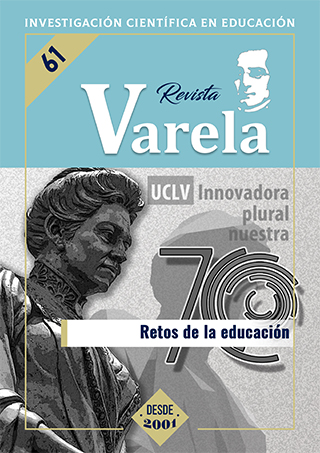
The current global context, characterized by strong social imbalances exacerbated by the COVID-19 pandemic, demands the design of initiatives that promote scientific and technological cooperation with a more inclusive approach, aimed at promoting progress in all areas of society . In these endeavors, education constitutes a key factor in social progress, for its contribution to enabling people to escape the cycle of poverty, reduce inequalities and achieve gender equality, as well as promoting tolerance, protecting the environment and in this way favor a healthier and more sustainable life, among other aspects.
Therefore, it is necessary to guarantee a quality education that promotes lifelong learning opportunities, to equip all people with the knowledge, skills and values that allow their full incorporation into society, hence the need to mobilize resources and implement innovative and appropriate solutions to specific situations in the educational context.
The aforementioned issues show the challenges that education faces in the current era, which set trends in its continuous improvement, among which the following stand out: attention to diversity, educational management in virtual environments, education in values, good practices at all levels of education including postgraduate, initial and continuing teacher training, environmental education for sustainable development, the relationship between school, family, community, among others. Precisely, the ideas expressed show the possibilities offered by this issue in its MONOGRAPHIC section to present contributions that address research, innovations and experiences applied in educational practice in the aforementioned aspects.
We remind you that in this new stage of development of the journal, the section INVESTIGATIONS IN EDUCATION is added to its monographic section. This section will contain works that are detached from the subject of the journal and it is a possibility that is offered to the authors to publish the articles that have not found a place in the summoned topics; To be accepted for evaluation by experts, these works must comply with the structure regulated for this type of article.

The improvement of educational systems in the current stage of social development, focuses its attention on the principle of educational inclusion as a way to care for human diversity, which means not only that everyone can have access to school, but also and as a priority that they can develop fully and continue learning throughout life.
An education is of quality if it promotes equity and for this it must be adapted to the needs and characteristics of the people and of the various social and cultural contexts; However, this concept has not always been understood about the differences existing in the subjects, their objective character, and the most just and developmental way of intervening from the pedagogical point of view.
Educational inclusion is focused on achieving socio-educational objectives for everyone, regardless of the modality or institution that provides the educational offer. In this regard, the 2030 Agenda, managed by the United Nations, promotes the inclusion and participation of citizens in economic and social development, and emphasizes gender equality and ethnic and racial diversity.

The Varela Journal ( http://revistavarela.uclv.edu.cu ) published by the Faculty of Early Childhood Education of the Central University "Marta Abreu" of Las Villas (UCLV), in its desire to disseminate scientific productions derived from research and Innovations with a pedagogical profile, presents its number 58 (May-August 2021), dedicated to the 20 years since the release of its first issue.
THE HUMANIST APPROACH IN THE NEW EDUCATIONAL SCENARIOS
Education from a humanistic approach must aim at the search for an integrating vision of the world, so that it can be interpreted and transformed. From this point of view, educational processes should promote the personal enrichment of the subjects, which prepares them to face their present and future life, as well as act accordingly with the changes that take place in society.
The humanistic sense emphasizes the social character of the educational process, which implies that said process cannot be isolated from man's problems, his ways of being, feeling, ethics and aesthetics, cultural and social contexts, economic and political. Hence the importance of considering educational goals that respond to social needs and are specified in actions aimed at the comprehensive training of people, which consider the formation of feelings, values and attitudes inextricably linked to knowledge and skills.
The aforementioned issues, in the new educational scenarios that characterize the current era, require transcendent changes in the ways and methods to develop humanistic training. Precisely, the contributions that are presented in this installment in its MONOGRAPH section deal with research work and experiences applied in educational practice on the issue raised. Likewise, this number in its section RESEARCH IN EDUCATION contains scientific works with varied themes, whose structure complies with the formal stages of the investigative process.

The Varela Journal (http://revistavarela.uclv.edu.cu) published by the Faculty of Early Childhood Education of the Central University "Marta Abreu" of Las Villas (UCLV), in its desire to disseminate scientific productions derived from research and Innovations with a pedagogical profile, presents its number 58 (January-April 2021), dedicated to the 20 years since the release of its first issue.
CHALLENGES AND TRENDS IN EDUCATIONAL RESEARCH IN THE PRESENT TIME (II)
The purpose of educational research is to offer solutions to problems in the educational context, and to contribute to the advancement of pedagogical knowledge; This implies substantial changes in the way of conceiving, organizing and executing it, to assume it as a complex and methodologically demanding task. Based on the ideas expressed, this number is offered in which contributions are presented that from different perspectives deal with the ideas raised related to educational research in the current era.
Finally, the authors of the articles presented are thanked for the contributions made to this issue of the journal, hoping that the dissemination of the ideas expressed may favor the development of future research and innovative experiences in the educational field.

The Varela Journal (http://revistavarela.uclv.edu.cu) published by the Faculty of Early Childhood Education of the Central University "Marta Abreu" of Las Villas (UCLV), in its desire to disseminate scientific productions derived from research and Innovations with a pedagogical profile, presents its number 57 (Sep-Dec 2020), dedicated to the 20 years of the Center for Education Studies "Gaspar Jorge García Galló" of the UCLV, which addresses the topic:
CHALLENGES AND TRENDS IN EDUCATIONAL RESEARCH CURRENTLY
The accelerated development of science and technology in the current era, especially the advances in Information and Communication Technologies, have had a strong impact on scientific research, which has revolutionized all phases of this process. In particular, in the field of educational research, in recent decades new epistemologies and research approaches have emerged, which take advantage of the potentialities that technologies offer to project in greater depth the knowledge about the educational reality in the investigated context, analyze the causes of the phenomena and propose criteria and ideas for their continuous improvement.
The purpose of educational research is to offer solutions to problems in the educational context, and to contribute to the advancement of pedagogical knowledge; This implies substantial changes in the way of conceiving, organizing and executing it, to assume it as a complex and methodologically demanding task. Based on the ideas expressed, this number is offered in which contributions are presented that from different perspectives deal with the ideas raised related to educational research in the current era.
In this installment, collaborations of professor-researchers from the Cesar Vallejo, the Tecnológica del Perú and the Norbert Wiener universities in Lima, Peru, the Zaragoza and the Rey Juan Carlos universities, both in Spain, as well as from the Ministry of Education are shown. Jalisco. Mexico. The publication also has contributions from Cuban authors from the Central Institute of Pedagogical Sciences (ICCP) of Havana, as well as from professors from the Center for the Study of Education of the UCLV.
Finally, the authors of the articles presented are thanked for the contributions made to this issue of the journal, hoping that the dissemination of the ideas expressed may favor the development of future research and innovative experiences in the educational field.

The Varela Journal (http://revistavarela.uclv.edu.cu) published by the Faculty of Early Childhood Education of the Central University "Marta Abreu" of Las Villas, in its desire to disseminate scientific productions derived from research and profile innovations pedagogical, presents its number 56 (May-August 2020) on the subject:
INNOVATIVE EXPERIENCES TO RAISE THE QUALITY OF LEARNING IN EDUCATIONAL INSTITUTIONS (II)
One of the fundamental problems towards which the improvement of educational systems on a world scale is directed is the need to overcome traditional styles of teaching. These styles have been characterized fundamentally, in that they focus the teaching-learning process on the teacher, whose main function is to transmit information, while the role of the student is reduced to receiving that information, thus limiting their intellectual work.
For this reason, transformations are required in the teaching-learning process at all educational levels to ensure that students learn to learn and become active subjects in their training; This would imply moving towards a new culture of learning, more adjusted to the complex needs of today's world, which demand learning strategies, which enable people to continue learning throughout life, a requirement that, without a doubt, transcends the old schemes school informational.
Taking into account the ideas expressed, this issue is offered in which contributions are presented that address the ideas raised and address innovative experiences to improve the quality of student learning, from different angles through research work and applied experiences in the current educational reality.
In this installment, collaborations of professor-researchers from the César Vallejo University of Lima and the Continental University of Arequipa, both from the state of Peru, the Bernardo O'Higgins University and the Manuel de Salas Experimental Lyceum in Santiago, Chile, the Universidad del Papaloapan, from Oaxaca and the Universidad Michoacana de San Nicolás de Hidalgo, from Morelia in the state of Mexico, as well as the New Providence Classical School in Nassau, Bahamas. The publication also has contributions from Cuban authors from the universities of Holguín, Pinar del Rio, Camagüey and Villa Clara.
Finally, the authors of the articles presented are thanked for the contributions made to this issue of the journal, hoping that the dissemination of the ideas expressed may favor the development of future research and innovative experiences in the educational field.

The Varela Journal (http://revistavarela.uclv.edu.cu) published by the Faculty of Early Childhood Education of the Central University "Marta Abreu" of Las Villas, in its desire to disseminate scientific productions derived from research and profile innovations pedagogical, presents its number 55 (January-April 2020) on the subject:
INNOVATIVE EXPERIENCES TO RAISE THE QUALITY OF LEARNING IN EDUCATIONAL INSTITUTIONS
One of the fundamental problems towards which the improvement of educational systems on a world scale is directed is the need to overcome traditional styles of teaching. These styles have been characterized fundamentally, in that they focus the teaching-learning process on the teacher, whose main function is to transmit information, while the role of the student is reduced to receiving that information, thus limiting their intellectual work.
For this reason, transformations are required in the teaching-learning process at all educational levels to ensure that students learn to learn and become active subjects in their training; This would imply moving towards a new culture of learning, more adjusted to the complex needs of today's world, which demand learning strategies, which enable people to continue learning throughout life, a requirement that, without a doubt, transcends the old schemes school informational.
Taking into account the ideas expressed, this issue is offered in which contributions are presented that address the ideas raised and address innovative experiences to improve the quality of student learning, from different angles through research work and applied experiences in the current educational reality.
In this installment, collaborations of professors-researchers from: the University of the Eastern Republic of Uruguay, the Evangelical University of Salvador, the National University of Chaco Austral in Argentina and the Mbave High School, in the Province of Huambo in Angola, are shown. Likewise, contributions are presented from the Universidad Nacional Mayor de San Marcos, the Universidad Nacional Autónoma de Tayacaja, the Universidad Nacional de Cañete and the Universidad Privada Norbert Wiener, all from the state of Peru. The publication also has contributions from Cuban authors from the University of Holguín and the Central University of Las Villas.
Finally, the authors of the articles presented are thanked for the contributions made to this issue of the journal, hoping that the dissemination of the ideas expressed may favor the development of future research and innovative experiences in the educational field.

The Varela Journal (http://revistavarela.uclv.edu.cu) published by the Faculty of Early Childhood Education of the Central University "Marta Abreu" of Las Villas, in its desire to disseminate scientific productions derived from research and profile innovations pedagogical, presents its number 54 (Sep-Dec 2019) on the subject:
LABOR PRACTICE: LINK BETWEEN TRAINING CENTERS AND SOCIAL REALITY TO PROMOTE EDUCATIONAL QUALITY
One of the current trends in the improvement of professional training is related to the need to strengthen the bond with the institutions in which the university student will work, once they graduate. Work practice constitutes a space to materialize what has been proposed, because it contributes significantly to the solution of academic, cultural, economic and environmental problems present in social reality, as well as to the formation of professional skills with scientific, technological and innovative thinking.
For this, the labor practice requires the essential integration of the employers' bodies of the future professionals with the educational institutions, in the design and execution of the activities to be developed in correspondence with the current potentialities and needs of the particular context in which it is inserted. The link between the careers and the labor entities should favor not only the training of competent professionals, but also the elevation of the quality and the work environment in the employers' organizations, which materializes the impact of the university in the community and in development. social territory.
Taking into account the ideas expressed, this issue is offered in which contributions are presented in the treatment of pre-professional practice from various angles through research work and applied experiences in the current educational reality.
In this installment, collaborations of professors-researchers are shown from: the Technical Industrial Educational Institution "Carlos Holguín Mallarino" in Cali, Colombia, the Bernardo O'Higgins University, from Santiago, Chile, the Institute of Social Sciences and Humanities of the University Autonomous of the State of Hidalgo in Mexico, as well as of the State of Ecuador, the Israel Technological University and the National Polytechnic School, both in Quito and the Autonomous Regional University of the Andes in Santo Domingo. The publication also has contributions from Cuban authors from the University of Cienfuegos, the University of Havana, the University of Holguín, the University of Moa, both in the province of Holguín, and the Central University of Las Villas.
Finally, the authors of the articles presented are thanked for the contributions made to this issue of the journal, hoping that the dissemination of the ideas expressed may favor the development of future research and innovative experiences in the educational field.

The Varela Magazine (http://revistavarela.uclv.edu.cu) published by the Faculty of Early Childhood Education of the Central University "Marta Abreu" of Las Villas, in its desire to disseminate scientific productions derived from research and profile innovations pedagogical, presents its number 53 (May-August 2019) on the subject:
THE PEDAGOGICAL MODELS OF THE 21ST CENTURY: THEIR APPLICATION IN THE CURRENT EDUCATIONAL REALITY (II)
The current and future panorama of education in the 21st century faces a scenario increasingly impacted by scientific and technological advances, which impose transcendent changes in educational processes to achieve quality education for all throughout life. In a time of rapid obsolescence of knowledge, the importance of people learning to learn and being motivated to acquire new knowledge constitutes a necessity for their continuing education, which requires the transformation and diversification of the pedagogical models to be applied in the different spaces in which educational processes are developed.
Taking into account the ideas expressed, this issue is offered in which contributions are presented that address the pedagogical models of the 21st century from various angles through research work and applied experiences in the current educational reality. In this installment, collaborations of professors-researchers are shown from: the Israel Technological University, in Quito, Ecuador, the Technical Industrial Educational Institution "Diez de Mayo" and the Santo Tomás Educational Institution, both in Cali, Colombia, the Bernardo O University Higgins, from Santiago, Chile, as well as the Instituto Tecnológico de Sonora of the Department of Education in Mexico. The publication also has contributions from Cuban authors from the "Carlos Rafael Rodríguez" University of Cienfuegos and the "Marta Abreu" Central University of Las Villas.
Finally, the authors of the articles presented are thanked for the contributions made to this issue of the journal, hoping that the dissemination of the ideas expressed may favor the development of future research and innovative experiences in the educational field.
Good educational practices in the development of skills in the digital age
Closing: February 28, 2026
Innovative experiences to promote quality education for all
Closing: June 30, 2026
APA Style 7ht edition in english
APA Style 7th edition in spanish
UCLV DSpace (Repository of scientific documents of UCLV)

Varela Journal by Central University "Marta Abreu" of Las Villas is licensed under a Creative Commons Reconocimiento-NoComercial 4.0 Internacional License.
Created from the work on revistavarela.uclv.edu.cu.